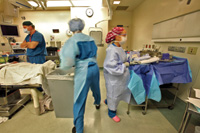|
After an
extensive review by the American
College of Surgeons (ACS), MUSC's
trauma program was verified as a
Level 1 Trauma Center. This
verification is the highest level
any trauma program in the country
can achieve.
"In fact, our
Level 1 Trauma Program is the only
one in the state to have received
national trauma verification at
any level," said Bruce Crookes,
M.D., associate professor and
trauma medical director.
"Achieving this recognition
required total commitment from the
entire hospital, and it means our
patients can expect the highest
level of care available at any
time, day or night."
The ACS Level 1
verification differs from the
status designated by the state of
South Carolina.
The actual
establishment and designation of
trauma centers is the function of
local, regional or state agencies.
ACS verification provides
confirmation that a hospital has
demonstrated the ability to
provide the highest quality trauma
care. The process requires an
on-site review by ACS surgeons and
a verification committee review.
Only after
meeting hundreds of demanding
criteria is a hospital awarded
this distinction. ACS surveyors
found no deficiencies in MUSC's
trauma program when visiting in
November 2011.
MUSC's trauma
team is staffed around the clock,
led by a trauma surgeon with board
certification in both surgery and
surgical critical care, and a team
of highly trained personnel from
the emergency room, operating
room, intensive care, radiology,
blood bank and respiratory
therapy.
 Trauma medical
director Dr. Bruce A. Crookes
and his team prepare for
emergency surgery at 1:20 a.m.photo by
Tyrone Walker and the Post and
Courier Trauma medical
director Dr. Bruce A. Crookes
and his team prepare for
emergency surgery at 1:20 a.m.photo by
Tyrone Walker and the Post and
Courier
Physicians from
more than 10 specialties are all
immediately available. MUSC treats
approximately 2,100 trauma
patients each year and
participates in trauma-related
research, community outreach and
education, and injury prevention
activities.
"MUSC is
prepared 24 hours a day, 365 days
a year to offer immediate care for
life and limb-threatening
injuries," said Crookes. "We
provide trauma patients with
instant access to the most
advanced technology, surgical
suites and critical care services,
which can make all the difference
in saving lives and decreasing
disabilities."
A study in the
New England Journal of Medicine
showed that patients treated at
Level 1 trauma centers fare
significantly better than those
with comparable injuries who are
treated at non-trauma centers.
Findings showed Level 1 trauma
centers can lower the risk of
death for severely injured
patients by 25 percent.
"The closest
hospital with an emergency room
may not be the best place to take
a trauma patient. For a seriously
injured patient, transport to a
Level 1 center such as MUSC can
increase his or her chances at
survival," said Crookes.
|



 Trauma medical
director Dr. Bruce A. Crookes
and his team prepare for
emergency surgery at 1:20 a.m.
Trauma medical
director Dr. Bruce A. Crookes
and his team prepare for
emergency surgery at 1:20 a.m.